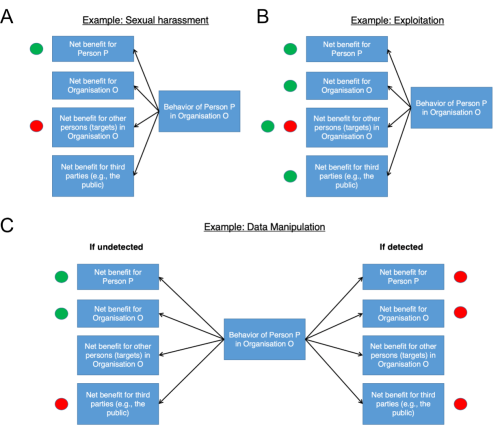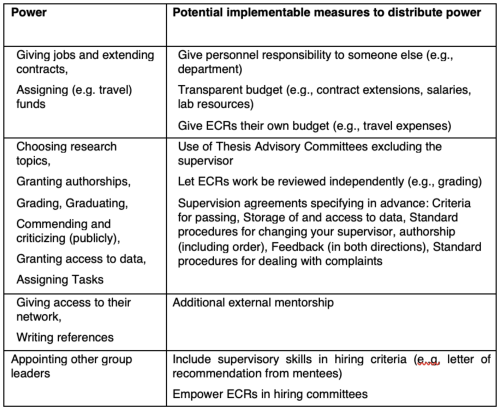First step towards recovery – admitting you have a problem. Seminar on “Power Abuse in Academia”
Posted by Anna Czarkwiani, on 9 February 2024
To continue our efforts in tackling difficult aspects of the academic work environment, we organized another seminar at the Center for Molecular and Cellular Bioengineering (TU Dresden) to discuss the issue of “Power Abuse in Academia” with Professor Daniel Leising from the TU Dresden Faculty of Psychology. Leising specializes in research into the psychology of judgements. Through his work as member of the Network against Abuse of Power in Science (https://www.netzwerk-mawi.de/en/), chairing the DGPs-Commission on Incentive structure, power abuse and scientific misconduct (since 2022) and detailed analyses of cases from outside academia, he strives to bring the topic of “Power Abuse” into the light and under scrutiny.
Power abuse by few can lead to effects felt by many
Prof. Leising began the seminar with a preface noting that this topic is not only of crucial importance but also highly sensitive. In order to facilitate a constructive discussion, it is important to stress that many in the position of power in academia are respectful, decent people with every intention to put public money to good use for the best of society. The issues discussed in the seminar relate to the few who take advantage of the system mostly for their own personal gain, why the current system is so susceptible to these types of abuses, and ultimately, how far-reaching the repercussions of the abuse by those few often are.
In order to abuse power, one must have power – defined as the “ability to exercise one’s will over others even if they resist or oppose” (Max Weber). Power differentials have a clear function in a work environment with the purpose of streamlining the achievement of shared goals. In science, these goals are:
- Providing high-quality research for the benefit of society
- Providing high-quality teaching of students
- Providing high-quality training and mentoring for Early Career Researchers (ECRs)
- Responsible and efficient use of public resources in working towards these goals
Abuse of Power takes place when power is illegitimately exercised to achieve personal goals (or goals of a group that a person belongs to) at the expense of others, and the severity of that abuse hinges on how long-lasting the likely effects are and the extent of the difference between the net benefits of the person in power and those of other affected parties. Prof. Leising displayed this via a series of informative graphs showing different types of scenarios (Fig. 1) and the respective net benefits for each form of power abuse, which can include: misappropriation of resources, exploitation, bullying, sexual harassment, and different forms of scientific misconduct.

Susceptibility of academia to power abuse
In the next part of the seminar Prof. Leising discussed the main causes for occurrences of Power Abuse specifically in the German Academic System. He began by introducing the Toxic Triangle model (Padilla et al, 2007) which highlights the roles of Destructive Leaders, Susceptible Followers and Conducive Environments in bringing about unethical conduct in organizations. He then addressed each arm of the triangle separately to yield a composite view of what specifically about (German) academia contributes to the issue.
Our current academic system selects its leaders on the base of two major qualifications: the ability to produce impactful science as rated by the number of publications in reputable journals, and the ability to present yourself as capable of conducting said impactful research via the acquisition of funding (grants, scholarships etc). Dishonesty in research, which can contribute to those qualifications, is unfortunately likely to be rewarded because the metrics are easily manipulated (e.g., authorships), quality control is tightly linked to the occasionally faulty peer review process, and sanctions are rare and inadequate. Additionally, the selection process only secondarily focuses on interpersonal skills, teaching qualifications, and experience or predispositions to leading or supervising other people. Therefore, this selection pressure may work in favor of people with personality dispositions like narcissism, low honesty-humility and even psychopathy. Once a person with those traits is in a position of power they can have a negative impact on their colleagues, their departments and organizations, which disproportionally outweighs their relatively small numbers.
Within the second arm of the toxic triangle (Susceptible Followers) are the Conformers and Colluders of the power abuse. Conformers can be people who are aware of the toxic behaviors but feel unable to stand up to a bully due to their low maturity or perceived hopelessness. Colluders, on the other hand, may just have a similar world-view as a problematic leader, high personal ambitions or bad values and thus actively promote the agenda of a power abuser.
Finally, there is the Conducive Environment where there is a high degree of positional power combined with low levels of institutional oversight, restraint and consequences. This is the case in academia, where Professors and Group Leaders hold a large amount of power in a variety of areas (Table 1) and, as mentioned before, dishonesty and antisocial behaviour can be beneficial to those individuals in light of insufficient control and sanctioning.
Recommendations for systemic and local structural changes
Towards the end of the seminar Prof. Leising focused on the recommended structural changes that could help to prevent instances of Power Abuse in Academia. Many of those were far-reaching and difficult-to-attain systemic changes for example in the publishing sphere (e.g., not for profit-publishing, open and citeable peer review, limiting the number of authorships per researcher), or within large organizations (external oversight, establishing effective complaints procedures). Others were simpler, locally-implementable measures (Table 1). Of key importance here would be the more equal redistribution of power such that dependencies and loyalties among individuals in professional relationships can be avoided.
Although it may sometimes be difficult to discuss the topic of power abuse in a well-balanced and objective manner, it is crucial to continue talking about potential ways for improvement, even if by small increments. The most practical recommendations suggested in the seminar were something that all members of scientific institutions could discuss together and potentially implement to make even small strides towards bettering our scientific community.

References:
Padilla, A., Hogan, R., Kaiser, R.B. (2007) The toxic triangle: Destructive leaders, susceptible followers, and conducive environments. The Leadership Quarterly. 18 (3): 176-194


 (1 votes)
(1 votes)